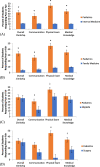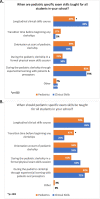Needs assessment for enhancing pediatric clerkship readiness
- PMID: 36978085
- PMCID: PMC10044806
- DOI: 10.1186/s12909-023-04167-7
Needs assessment for enhancing pediatric clerkship readiness
Abstract
Background: Many students report feeling inadequately prepared for their clinical experiences in pediatrics. There is striking variability on how pediatric clinical skills are taught in pre-clerkship curricula.
Methods: We asked students who completed their clerkships in pediatrics, family medicine, surgery, obstetrics-gynecology and internal medicine to rate their pre-clinical training in preparing them for each clerkship, specifically asking about medical knowledge, communication, and physical exam skills. Based on these results, we surveyed pediatric clerkship and clinical skills course directors at North American medical schools to describe the competence students should have in the pediatric physical exam prior to their pediatric clerkship.
Results: Close to 1/3 of students reported not feeling adequately prepared for their pediatrics, obstetrics-gynecology, or surgery clerkship. Students felt less prepared to perform pediatric physical exam skills compared to physical exam skills in all other clerkships. Pediatric clerkship directors and clinical skills course directors felt students should have knowledge of and some ability to perform a wide spectrum of physical exam skills on children. There were no differences between the two groups except that clinical skills educators identified a slightly higher expected competence for development assessment skills compared to pediatric clerkship directors.
Conclusions: As medical schools undergo cycles of curricular reform, it may be beneficial to integrate more pre-clerkship exposure to pediatric topics and skills. Further exploration and collaboration establishing how and when to incorporate this learning could serve as a starting point for curricular improvements, with evaluation of effects on student experience and performance. A challenge is identifying infants and children for physical exam skills practice.
Keywords: Clinical skills; Pediatric clerkship; Pediatric physical examination.
© 2023. The Author(s).
Conflict of interest statement
The authors declare that they have no competing interests.
Figures




Similar articles
-
Pelvic and breast examination skills curricula in United States medical schools: a survey of obstetrics and gynecology clerkship directors.BMC Med Educ. 2016 Dec 16;16(1):314. doi: 10.1186/s12909-016-0835-6. BMC Med Educ. 2016. PMID: 27986086 Free PMC article.
-
Does Delaying the United States Medical Licensing Examination Step 1 to After Clerkships Affect Student Performance on Clerkship Subject Examinations?Teach Learn Med. 2021 Aug-Sep;33(4):366-381. doi: 10.1080/10401334.2020.1860063. Epub 2020 Dec 28. Teach Learn Med. 2021. PMID: 33356583
-
Current and Optimal Training in High-Value Care in the Internal Medicine Clerkship: A National Curricular Needs Assessment.Acad Med. 2018 Oct;93(10):1511-1516. doi: 10.1097/ACM.0000000000002192. Acad Med. 2018. PMID: 29517522
-
The Harvard Medical School-Cambridge integrated clerkship: an innovative model of clinical education.Acad Med. 2007 Apr;82(4):397-404. doi: 10.1097/ACM.0b013e31803338f0. Acad Med. 2007. PMID: 17414198 Review.
-
Physical medicine and rehabilitation clinical experiences: A narrative review of curricula and educational interventions.PM R. 2025 Mar;17(3):337-343. doi: 10.1002/pmrj.13262. Epub 2024 Sep 13. PM R. 2025. PMID: 39268970 Free PMC article. Review.
Cited by
-
Pediatric Intersession: An Upfront Flipped-Classroom Curriculum to Promote Pediatric Clerkship Readiness.J Med Educ Curric Dev. 2024 Feb 7;11:23821205241229774. doi: 10.1177/23821205241229774. eCollection 2024 Jan-Dec. J Med Educ Curric Dev. 2024. PMID: 38327827 Free PMC article.
References
-
- Held MR, Gibbs K, Lewin LO, Weinstein AR. Do pre-clinical experiences adequately prepare students for their pediatrics clerkship: a needs assessment to inform curricular development. Med Sci Educ. 2017;27:515–521. doi: 10.1007/s40670-017-0422-4. - DOI
-
- Small RM, Soriano RP, Chietero M, Quintana J, Parkas V, Koestler J. Easing the transition: medical students' perceptions of critical skills required for the clerkships. Educ Health (Abingdon) 2008;21(3):192. - PubMed
MeSH terms
LinkOut - more resources
Full Text Sources
Research Materials

